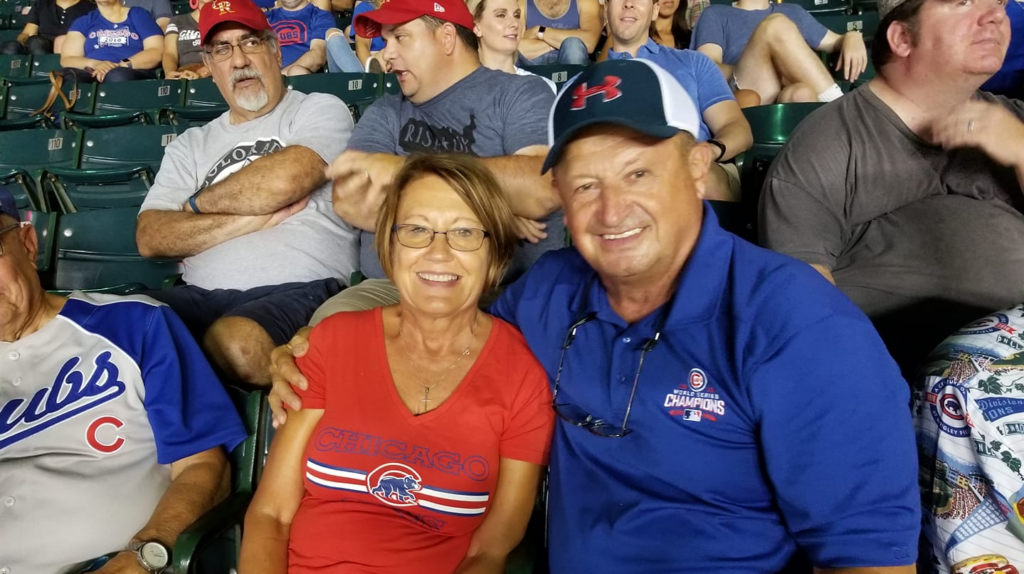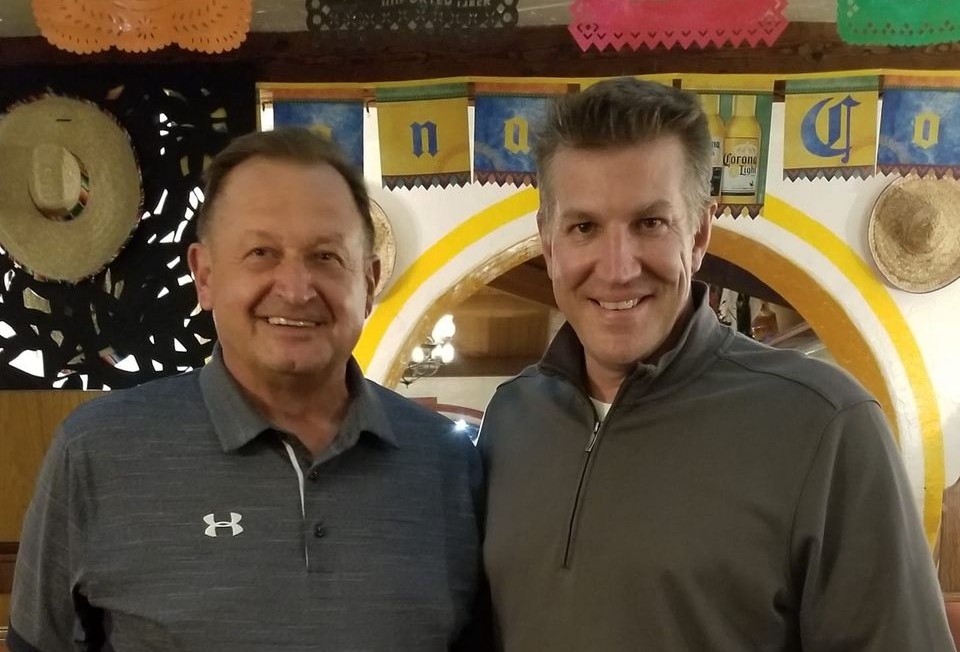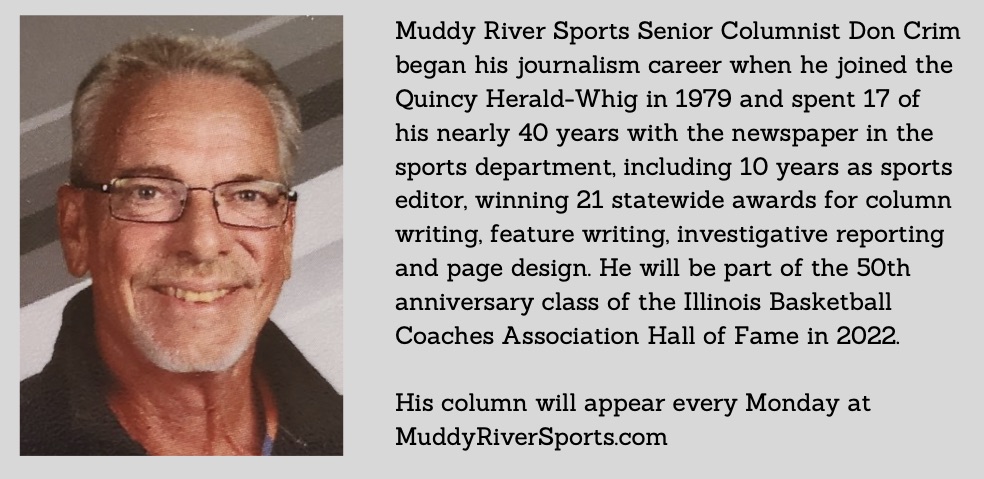Crim: Cappel’s three-year stint coaching QHS football created memories he still treasures

SHOREWOOD, Ill. — Dean Cappel and his wife, Connie, live in an active 55-and-older community west of Joliet. When they’re not traveling or doting on their six grandchildren, they like to spend time playing water volleyball and bocce ball and riding bicycles.
“I just came back from the weight room,” Cappel said as we began an hour-long conversation. “I still try to pump a little iron. It’s important to stay active, I think. The results aren’t that good if you don’t.”
Cappel, now 73, won nearly 200 games during a 31-year career as a head football coach at five Illinois high schools, including Quincy High School. He retired following the 2009 season, one year after being inducted into the Illinois High School Football Coaches Association Hall of Fame.
“Football is such a great game,” he said. “It’s addictive. I miss coaching, especially Friday nights. I miss the preparation, the coaches.”
Cappel certainly would have enjoyed the atmosphere when Quincy hosted United Township for its homecoming game in mid-September.
Tents were pitched all along the grassy area west of the entrance to Flinn Stadium, and tailgating began hours before kickoff, including a contingent from the class of 1981 back home for a weekend reunion.
The smell of food cooking on barbecue grills hung over the parking lot, which was so congested many fans opted to find available spots elsewhere along Maine Street and walk to the stadium. The stands were nearly full by game time and the Blue Devils turned a close game into a rout in the second half to improve to 3-1.
The mood around the QHS football program Cappel inherited in 1984 was considerably less festive.
While the Blue Devils have enjoyed eight winning seasons and as many playoff appearances in 14 years under coach Rick Little, and are now 4-1 this fall, they had suffered through nine consecutive losing seasons and were amid a winless streak that eventually would reach 27 games when Cappel arrived.
Furthermore, Quincy now has a $1.6 million state-of-the-art facility at the western edge of Flinn Stadium, which today is equipped with artificial turf and a large electronic scoreboard. One side of the facility houses a locker room with 70 lockers for football, a player lounge, coach and trainer facilities, showers and restrooms.
The other half consists of a weight room with 12 power rack stations and free weights for weight training, conference rooms, and a film room with 70 stadium-style seats, projector and 140-inch screen.
The program Cappel took over, by contrast, had no weight room. In fact, the new coaching staff was forced to convert then-shuttered Madison School — 19 blocks from the stadium — into a weight training facility.
He was fortunate, however, that Don Taylor followed him from Herscher to serve as an assistant coach. Jim Wosman moved to QHS from Quincy Notre Dame and Jose Quintero, the head coach at Marceline (Mo.) High School who had interviewed for the Blue Devils’ job, agreed to come aboard.
“We instantly had a staff, which was really a plus,” Cappel said.
While the Blue Devils dominated boys basketball and soccer in the Western Big 6 Conference in those days, football was a different story. In fact, some used to say that when it came to football, it was the Western Big Five … and Quincy.
That was the job Cappel stepped into when he was 34 years old after a successful seven-year run at Herscher, which included three playoff appearances at a time before postseason expansion when two or three losses could keep teams on the outside looking in.
“Something drew me to the town,” he said of his move to Quincy. “There was the lure of coaching at a bigger school and taking something that was down to being respectable.”

‘What a majestic river town’
The Blue Devils, playing a bevy of underclassmen, were winless his first season. They won their first three games his second season to generate excitement but stumbled down the stretch to finish 5-4, which was still an accomplishment by Quincy standards.
It all came together his third season in 1986 when Quincy went 7-2 during the regular season, finished second in the WB6 and secured a Class 6A playoff berth largely behind the right arm and legs of quarterback Eric Bush.
Bush, who later would spurn an offer to sign with the New York Mets to play football at Michigan, threw for 20 touchdowns, ran for six more and amassed more than 2,000 yards of total offense to earn Illinois Co-Player of the Year honors from the Champaign News-Gazette.
Bush had a bevy of wide receivers to throw to — Mark Summers, Mike Kirkpatrick and Jeff Rupert — and Tommy Benton was a solid running back. The Blue Devils’ offense could light up a scoreboard.
Quincy High School football that fall was relevant again.
Only the success proved fleeting. With his wife suffering from health issues that necessitated moving closer to a doctor in the Kankakee area, Cappel departed the following spring.
He went to Bradley Bourbonnais, another downtrodden program, and produced three winning records in as many seasons before leaving teaching and coaching for two years, citing burnout.
“When I coached, there was only one way to do it, and that was to jump in with both feet,” he said. “You have to sacrifice some things to be successful. Maybe I was not smart enough to do it with less effort.”
He was coaxed back into coaching in 1992 and spent six seasons at Clifton Central, reaching the state quarterfinals three times and the semifinals once. He closed his career with a 12-year stint at Braidwood Reed Custer.
Meanwhile, it would be another 17 years before Quincy posted a winning record during the regular season and played a postseason game. During a 28-year stretch, beginning in 1975, the Blue Devils posted only two winning records during a regular season — both with Cappel at the helm.
“I’ve been blessed every place I’ve been,” he said. “That’s the beauty of coaching several places. There are good people everywhere.
“We loved Quincy. What a majestic river town. People reached out to offer help. (The late) Harold Knapheide, what a booster he was. I had two relentless recruiters in Jim Douglas and (the late) Bob Bush. They knew every kid we needed to get out for football. They were the pied pipers.
“As a coach, you want your teams to get better each year and that happened. We were getting better athletes out and the kids were taking football more seriously. It’s always good to sit back and reminisce, to talk about the good times.”
Before the good times, however, were some trying ones.
QHS spotted Quincy Notre Dame a 20-0 halftime lead in Cappel’s first game. The Blue Devils scored twice in the fourth quarter and were driving for a potential go-ahead score when their sixth turnover of the night resulted in a six-point loss.
The following week, Quincy played at Burlington, one of the top programs in Iowa. It was, by today’s standard, a buy-a-win-game for the Greyhounds.
“Kerry Anders warned me about Burlington before the season,” Cappel said. “He said we had no business playing them. They had a running back who was going to Nebraska. I went to see (QHS athletic director) Bill Gross. I asked him, ‘How did we schedule a team like that?’ He said, ‘They paid for our charter busses to go there, so it was a good deal.’ ”
Not so much for the Blue Devils. They were held to minus-43 yards rushing and lost 48-0.
“It’s 40-0 midway through the third quarter and I’m waving the white flag,” Cappel said. “We were not ready to play a premier program like that. Kids were getting hurt. We were not physically strong enough to go up against their offensive and defensive lines.
“I say to Bob Bush on the sideline, ‘I wish somebody would pull the power cords so we could get out of here.’ Two minutes later, the whole stadium went dark. We were halfway across the field to our busses when the lights came back on and we had to finish.
“Bob claimed he didn’t have much to do with that, but I’m pretty certain he did.”
Those of us who knew Bob Bush would agree.
‘I’m really proud of that’
One thing Cappel did that first season, however, was to schedule junior varsity games on Monday nights to give his underclassmen additional experience.
“We took money out of the pop machines in the stadium to pay for chartered busses,” he said. “We’d always stop at a buffet to feed the kids really good on the way home.”
Among the places Quincy traveled were St. Louis and Jefferson City in Missouri and Springfield in Illinois.
“The first time we won a JV game was against Springfield Griffin,” Cappel said. “The kids carried the coaches off the field. Kenny Leonard, the Griffin varsity coach, came up to me and said, ‘You guys take JV games pretty seriously.’
“I said, ‘Ken, you have to understand, for some of these kids this was the first game they have ever won.’ The kids gained some experience and tasted a little success, and I think that made a big difference the next couple of years.”
The football staff also had to learn to live in the shadow of the school’s hugely successful basketball program, which was just a few years removed from its first state championship since 1934 and a then-record 64-game winning streak. The Boys of Winter were still the toast of the town.
“The big thing for us was getting kids out for football, and Jerry (Leggett) had a pretty tight hold,” Cappel said. “He always told me he supported the football program and wanted kids to play more than one sport — as long as it didn’t interfere with his program.
“Jerry treated our program very well, although we had to adjust our schedule in the summer so his kids could do both. We usually had a cup of coffee in Bill Gross’s office in the afternoons to talk. He called me ‘Kid.’ I took a lot of what he said seriously.
“Eric Bush made a deal with Jerry his junior year. Eric said, ‘I’m going to play basketball, but only if I have 15 minutes before practice to throw the football and do quarterback drills on the sideline.’ Jerry agreed to let him do it. Eric was a good athlete and Jerry wanted him on the basketball team.”
Eric Bush was one of the most highly-recruited football players in Quincy history. Cappel remembers when Cam Cameron, then Michigan’s quarterback coach and later an assistant and head coach in the NFL, came to town.
“I had all nine game films and a highlight tape ready for him,” Cappel said. “He watched five plays and got up. I thought he wanted a cup for coffee or something, and instead he told me he had seen enough. I said, ‘Coach, I have all this film.’
“He said, ‘Coach, either a kid has it or he doesn’t, and he has it. I’m going down to talk to his counselor and principal to find out as much as I can about this kid.’ ”
Those are the kind of memories Cappel still holds 36 years since he last roamed the sideline in Quincy, a time, however short, when a coach and a talented, athletic class merged. Yet it’s not just the growth on the field that he remembers.
“I was only there for three years, but one thing I find remarkable is some of the successful professionals that came out of the classes I was involved with,” he said. “Lawyers, physicians, businessmen. They have made something out of their lives.
“I’m really proud of that.”

Miss Clipping Out Stories to Save for Later?
Click the Purchase Story button below to order a print of this story. We will print it for you on matte photo paper to keep forever.
